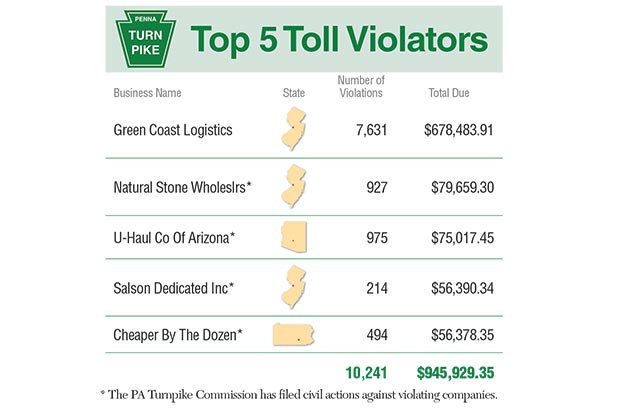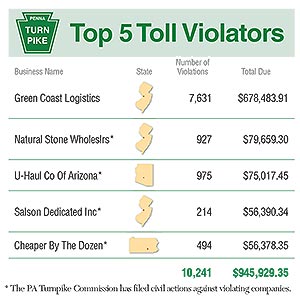Pennsylvania Turnpike Commission Seeks Toll Cheats


This story appears in the Nov. 7 print edition of Transport Topics.
Frustrated over more than $9 million in unpaid tolls in the past two fiscal years, the Pennsylvania Turnpike Commission has upped the enforcement ante.
The agency successfully shepherded a bill through the Legislature that would permit pursuing agreements with other states to go after violators from those jurisdictions. Gov. Tom Wolf was expected to make the bill law by a Nov. 4 deadline.
“I’m saying to another state that these people are on my list, can you put them on your list and treat them the way that you would on my behalf and I’ll do the same for you?” explained Neil Gray, government affairs director for the International Bridge, Tunnel and Turnpike Association. “I give Pennsylvania points for taking the necessary steps to where they can hope to resolve this.”
Two dozen trucking companies owed at least $20,000 apiece in unpaid tolls in Pennsylvania when the state’s fiscal year ended May 31. Green Coast Logistics of South Plainfield, New Jersey, heads the list with nearly $680,000 in unpaid tolls and more than 7,600 violations. All told, the top 24 companies owe more than $1 million, the commission said.
“This is the first time we’ve published this list,” said Carl DeFebo, spokesman for the commission, which has sent notices to violators in all 50 states. “We wrote off $3.7 million in tolls in fiscal 2015. That total climbed to $5.4 million in fiscal 2016. That’s a 45% increase, and those numbers don’t include the violation fees.”
Seventeen of the 24 firms are from other states, including 10 from New Jersey. The Garden State is home to three of the top four violators and four of the top eight. Transport Topics reached out to all six firms that had exceeded $50,000 in fines. None of the messages was returned.
None of those 10 New Jersey companies is a member of the state’s Motor Truck Association. As Gray said, “This is less than the semis and more the box trucks.” Gray said while not every state with tolls has publicly shamed major violators as Pennsylvania has, it’s not uncommon. Nor are reciprocity agreements. For example, Maine, Massachusetts and New Hampshire have them with each other, he said.
“In Florida, it can take eight, nine months to determine that you’re a violator. And only after you fail to respond to three notices, can I start applying penalties and fees. That varies by state,” Gray said.
In Pennsylvania, after six notices or $500 worth of violations, the commission works with sister agencies within state government to suspend vehicle registrations and drivers’ licenses, but has lacked the power to do so with out-of-state drivers and firms. Hence, the need for the bill about reciprocity agreements.
“We have reached out to the top 24 numerous times,” DeFebo said. “My understanding is that these discussions [with other states] have already begun, so I don’t think they would take too long to finalize if the bill becomes law.”
The Turnpike Commission, he said, would educate all customers, not just the trucking industry, if the bill were to become law. DeFebo expected reciprocity agreements to go into effect next summer.
DeFebo said that technology has been a boon and a hindrance. “We have more challenges with people using their GPS, ignoring signage and making an honest mistake driving through an E-ZPass lane without having E-ZPass,” DeFebo said. “If you travel from Harrisburg to Philadelphia and you didn’t pay, we’ll accept a receipt from a Wendy’s in Harrisburg near the interchange or from a hotel there as proof of where you got on. We’re very understanding about people who make an honest mistake, but for goodness sake, we do need some teeth to be able to pursue these egregious violators.”
DeFebo said Pennsylvania also has been a victim of its typically open system.
“We’ve never had mechanized barriers in our lanes,” DeFebo explained. “When you pull up to Ohio’s toll plazas in the E-ZPass lane, if [the device] doesn’t sense [a transponder], the arm doesn’t go up. That would be chaos for us in Philadelphia and Pittsburgh because of the huge amount of traffic volume.”




